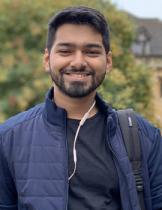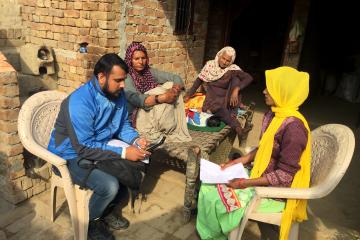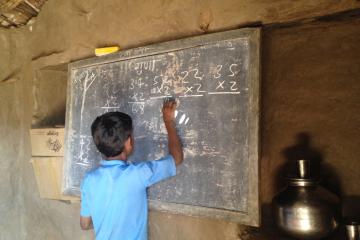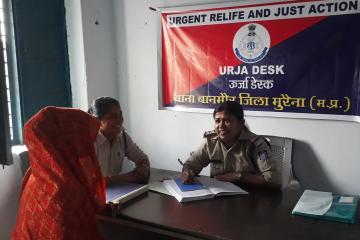
Researcher Spotlight: Gautam Rao on co-producing evidence with policymakers
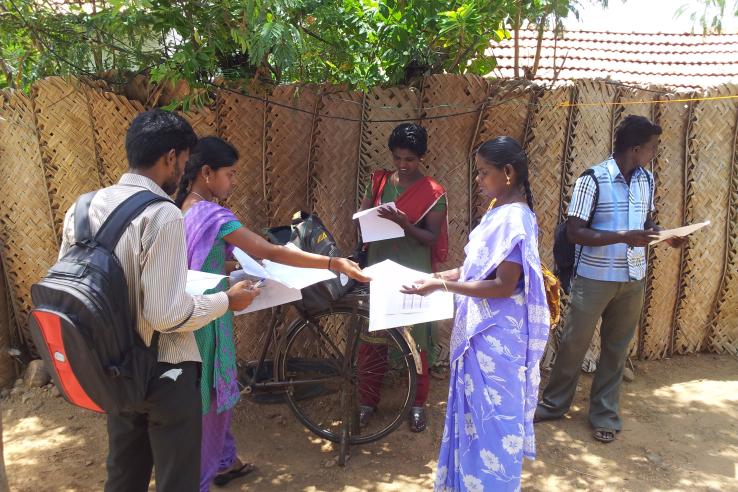
This podcast and blog series brings together researchers reflecting on their experiences conducting impact evaluations in India. From working in diverse local contexts to engaging with government and civil society, each episode offers a window into the realities of producing policy-relevant evidence on the ground.
In this episode of the Researcher Spotlight Series, host Sambhav Choudhury speaks with Gautam Rao, associate professor of economics at UC Berkeley. From his unconventional journey from electronics engineering to economics, Gautam shares insights on his behavioral economics and mental health research in India. He discusses his collaborative study on psychotherapy's long-term effects in Goa, explores effective strategies for building partnerships with policymakers, and emphasizes the importance of fieldwork in challenging academic assumptions.
Want to learn more? Explore other podcast episodes in this series where we speak with Sandip Sukhtankar on his research in India, Shobhini Mukerji on her journey into development economics, Ariel Zucker on applying economic theory to real-world solutions, and Harini Kannan on scaling evidence-informed programs with governments.
Listen to our conversation
Sambhav: Hi everyone, welcome to an episode of J-PAL South Asia's Researcher Spotlight conversation series. My name is Sambhav Chaudhury and I am a research associate at J-PAL South Asia. Today I'm in conversation with Gautam Rao. Gautam is an associate professor of economics at UC Berkeley. He is one of the pioneers of Behavioral Development Lab, a research center in India that integrates behavioral economics and development economics to understand the causes and consequences of poverty. Gautam replied to me within five minutes when I reached out to him for this conversation, but if he's taking longer to reply, it's probably because of his pet dog Pasha, whose photo you can find on his website. Hi Gautam, thanks for talking to us today.
Gautam Rao: Thank you for having me. I'm excited to chat with you.
Sambhav: You pursued an undergraduate degree in electronics engineering and then a master's degree in environment policy. How did you get interested in development economics and the experimental approach?
Gautam: That's a great question. I had a very unusual path from my bachelor's to my master's. I think the one thing I was always interested in was trying to do research that might improve human welfare in India in some way. I had no idea what economics was—I'd never taken an economics class as a bachelor's student. But I spent a lot of time outside the classroom when I was an engineering student in India.
I didn't know what I was doing, but I would be wandering around neighborhoods of Delhi doing surveys of people, talking to officials, sometimes going to villages in Himachal Pradesh. But I really didn't have any training or frameworks for thinking about these issues.
Then when I came to the US for my master's, I saw my first economics course, and I realized that the tools that economists have—thinking about demand and supply, about public goods, about externalities—these were enormously powerful tools. I quickly started to see that economists were using these tools and using data collection, using experiments, using statistical methods to study basically any topic under the sun that could matter for people's well-being. I found that really exciting and never looked back from that moment.
Sambhav: Thanks, Gautam. So in your paper "The Long-Run Effects of Psychotherapy on Depression, Beliefs, and Economic Outcomes," you study the effect of psychotherapy on depressed adults in Goa. Could you briefly tell us how you went about identifying that a state like Goa would be the correct context to set the study in? And for a project that deals with such a sensitive topic like mental health, how did you create protocols and processes as well as sensitize your team regarding the nuances of mental health?
Gautam: Whenever I'm telling people, especially people in India, about research that we are doing on mental health in Goa, the instinctive reaction you get from people is "Are people depressed even in Goa?" because in India we see Goa as this happy place that people may go for holidays. But of course, there's a real burden of mental ill health—depression, anxiety, alcohol abuse, etc. in Goa as well, and really in every other part of the country.
We didn't choose Goa because we thought it's the only place or the best place to study it. Rather, in a lot of work that I've been doing nowadays, I collaborate with researchers from psychiatry, public health, and this field called global mental health. Through that, we discovered that actually India produces some really terrific research on mental health, and there's an organization called Sangath based in Goa, which is a pioneer in developing very simple forms of therapy—psychotherapy—which can be delivered by people without a lot of training. That is, you don't need to be a psychologist or a psychiatrist, but with a few weeks of training, you can deliver psychotherapy to help people with psychological distress and depression.
They had already completed a clinical trial—a randomized experiment—in Goa, and we reached out to them after the fact, saying "Look, can we collaborate with you to go back and measure the economic outcomes of improving mental health through therapy and also to understand if the effects persist for a long time?"
So in this way, we were able to leverage the work that these psychiatrists had already done, and we didn't have to reinvent the wheel. That's an approach that I'm very excited about in general— these collaborations between economists and researchers from other fields. I think we have a lot to learn from each other and can do a lot of good that way.
One of the ways we learned from them is what you were asking: How do you create protocols or processes to deal with such sensitive and difficult issues? I think the answer is we don't need to reinvent the wheel. We were able to adopt and build on the protocols that the leading researchers and practitioners had already developed through their experience, and were able to adapt them as opposed to coming up with something from our minds. So that's how we did that.
Sambhav: Thanks. And more broadly, how do you think evidence generation in the mental health space is shaping up in India, and how can J-PAL South Asia play a more significant role in this?
Gautam: I think that's a great question, and actually I think this is a tremendously exciting space of research. There's been a huge mental health crisis, particularly amongst young people around the world in every country that we have data in, including India. I think we can really unlock a lot of exciting policy interventions and improvements through these cross-disciplinary collaborations that J-PAL South Asia is facilitating.
Some of the best research on this is coming out of India, but also all around the world—Sub-Saharan Africa, Latin America, rich countries as well. They're all facing this problem. I think forming these partnerships, connecting policymakers—and I should say, of any topic I've ever worked on, this is one where I think policymakers are most concerned right now and often find themselves in a situation where they're facing really a crisis of mental ill health without having a clear game plan of what to do about it.
J-PAL South Asia has really invested in building these connections with policymakers and being there to help them when they're looking for evidence on these questions. By facilitating those connections to researchers like me and to psychiatrists that I'm familiar with, I think we can do a lot to push this research agenda forward, but more importantly, also the policy agenda forward.
Sambhav: On your projects, you work with numerous stakeholders. In your experience, what key factors or strategies have proven effective in forming partnerships with governments, mental health organizations, and local implementing partners?
Gautam: I would say there are two things that have worked well. One is when an organization like J-PAL South Asia has put in place a sort of institutional partnership. For example, the partnership with the Tamil Nadu Government has meant that over a number of years, there has been support for a series of projects that are of interest to the government but are also intellectually interesting and scientifically important from the researcher's perspective.
It's not then a case of just me as a single investigator or professor trying to make a one-on-one partnership with a particular policymaker, but instead, it's under the umbrella of this broader framework. I think that's been a tremendous achievement of J-PAL South Asia, and I'm very excited for more such things to happen.
The other thing I've realized is that often in my career, I was going to a policymaker trying to convince them that something I think is important may be important for them. I've realized now that what I really want to do more of, and what has been much more successful, is when there is a problem that's coming from the policymaker's side, and I have some relevant expertise.
The most exciting part of all, which I've been able to do more recently, is co-producing the science together with the policymaker. That is, if you're in a meeting where you are brainstorming with the relevant bureaucrat or minister about how this problem can be solved, and you tell them something like, "Look, this was tried in Karnataka in this way, or it was tried in the USA or in Brazil in this way—could we do it here?" And they say, "Well, here are some of the issues, here are the constraints in Tamil Nadu, here's what will and won't work," and you kind of problem-solve together. I think that is tremendously exciting and is really what I'm going to be continuing to aim for in the future.
Sambhav: Thanks, Gautam. So a lot of my peers and myself are interested in the mental health space and doing research in it in general. Could you please describe a memorable experience from your fieldwork that significantly shaped your researcher perspective?
Gautam: Let me pick one of my first experiences of fieldwork, which was in rural Karnataka. It's not in the space of mental health, but I'm a city boy—I grew up in India in many different cities, but I'm not so familiar with villages. And of course, India, as you know, is so enormously diverse - different parts can almost feel like going to a foreign land.
I think the most exhilarating thing for me about going and doing fieldwork is that almost always I discover that my theory or my prior that I was coming up with in my ivory tower is wrong. When you actually encounter real people or when you actually encounter data that's coming from real people, rigorously collected, you keep discovering you're wrong, which is in my view the whole idea of fieldwork and the whole idea of science.
For example, in rural Karnataka, I went there to investigate a project about how farmers learn to adopt different technologies, working with a really exciting NGO, Digital Green. In my economic model in my mind, the whole job of a farmer or the whole life of a farmer in a village is to think about farming, to discuss farming. I thought all day they'll be discussing farming with their neighbors, they'll be thinking about which technologies to adopt, what to do—this was my mental model.
Just a few days spent in some villages in Karnataka, and I realized actually farmers spend most of their time not talking about farming to other farmers. Most of their time when they're talking to their neighbors, they are gossiping about other things—talking about the news, politics, whatever local gossip is relevant. They often didn't know a lot about the technologies that their peers were using. This was just completely shocking to me—this was not in our standard model of how farmers must be discussing.
It was just the first example to me of realizing that when you go out and talk to people, do actual fieldwork, it'll question your priors and you'll understand the world much better. I can give you so many examples like that of all the times I was wrong and learned it through fieldwork.
I really think that's been the real strength and beauty of development economics for the last 30-odd years—it's forced economists, or it's involved this movement of economists coming out of the ivory tower and actually engaging with and talking to real people. I think that's made our work much more scientific, much more closely tethered to reality. And actually, I think it's one reason why my area of behavioral economics has gotten a lot of acceptance within development economics—not because people in developing countries are in some way more irrational or anything like that, not at all. Rather, it's because when you encounter real people and actually observe what's happening in the world, you realize that the simplistic models of economics leave a lot out. So for me, fieldwork has been absolutely critical in this journey.
Sambhav: Thanks, Gautam. Actually, as a young researcher myself, I'm also constantly amazed by the responses that I hear from people. Even though I was born and brought up in Odisha, just doing fieldwork in Odisha has given me a lot of perspective and opened my mind to a lot of other hypotheses that I had not thought about earlier.
Gautam: I'm glad to hear that, and I'm not surprised at all.
Sambhav: So the final question that I have for you is: What research projects or areas are you currently excited about or planning to explore in the near future?
Gautam: A major part of my current research agenda is on mental health, and particularly mental health amongst youth. For example, recently, some of our collaborators in Chennai discovered that something like 30+ percent of college students in Chennai have thought about suicide in the last year. This is a shockingly high number compared to what we would have expected 10-20 years ago, but this is something that's being seen around the world. Rates of depression, anxiety, self-harm, and suicidality have risen amongst young people around the world.
So understanding what's driving that and, more importantly, what can we do about it is central to my agenda right now. That's something I'm pursuing in work in India, in Tamil Nadu, in work in Colombia in Latin America, and actually some work in the US as well. So I think that's what keeps me up at night right now.
Sambhav: I think that is quite an interesting field to be working in, and I'm very excited to see what you come up with. Those were all the questions that I had. Thanks so much, Gautam, this was a very interesting conversation, and thank you for talking to us today.
Gautam: Thank you so much. It was great to chat with you, and I'm really excited that J-PAL has its 20th anniversary1.
[1] This conversation was recorded in late 2023, when J-PAL celebrated its 20th anniversary.
